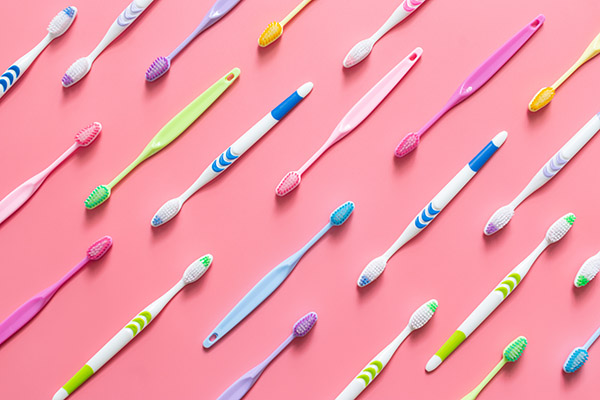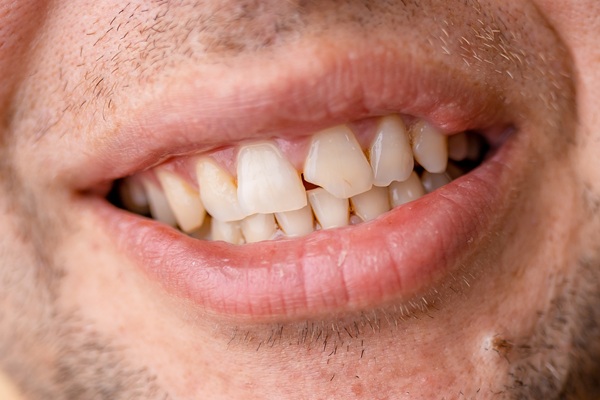 Everyone learns oral hygiene basics when they are young, but some details get lost over time. For example, many adults are confused about what type of toothbrush to use. This simple tool comes in many different forms, including a variety of sizes and a range of bristle textures. You may wonder why there are so many options; does it really matter what kind of toothbrush you use?
Everyone learns oral hygiene basics when they are young, but some details get lost over time. For example, many adults are confused about what type of toothbrush to use. This simple tool comes in many different forms, including a variety of sizes and a range of bristle textures. You may wonder why there are so many options; does it really matter what kind of toothbrush you use?
The truth is, the type of toothbrush has a significant impact on your oral health. To help you find the right brush, here is a breakdown of the different types and their pros and cons.
Electric or disposable
When you were first learning oral hygiene basics, disposable toothbrushes may have been the only option. However, there are many electric models today. Unlike disposable toothbrushes, electric versions do the brushing for you with a moving head powered by a rechargeable battery. So, which should you have in your cabinet? There are a few factors to consider before making the decision.
Safety
Are your teeth and gums sensitive? If so, an electric toothbrush may be better than a manual one. When you use an electric brush, you only have to gently hold the head against your teeth, and the motor does the rest. When you use a regular brush, you have to apply the pressure yourself, making it easier to exceed the recommended pressure.
Effectiveness
Certain electric toothbrushes are more effective at removing plaque than brushes you have to move manually. Called rotation oscillation toothbrushes, these dental tools clean in circles, which is the recommended technique.
Remember that whether you use an electric or disposable brush, you still have to clean for the recommended two minutes. An electric toothbrush may make it easier to do so, especially if you have reduced grip strength.
Cost
Electric brushes are significantly more expensive than disposable ones, making some people hesitate to purchase them. However, once you buy the brush base, you can use it for years and replace the head every three months. The heads are much more affordable than the base and come in packs to maximize savings.
Soft or hard bristles
The prevailing wisdom in oral hygiene basics is that soft bristles are better, but that does not stop manufacturers from producing medium- and hard-bristle brushes. Why are these options available if dentists do not recommend them?
While hard-bristle brushes should not be used daily, they do have a purpose: stain removal. Occasional use of hard-bristle brushes is perfectly fine as long as you are careful and not overzealous. If you brush too hard against your gums, you can damage them, resulting in the following:
Toothbrush choices
So, is there a brush that is better than all the rest? The answer is complicated.
There is probably a toothbrush that works well for you, but that does not mean it works for everyone. Each person has different oral care needs, so you should not worry too much if a toothbrush is the "top of its class." Instead, you should find one that is comfortable to hold, does not hurt your gums, and cleans effectively.
Request an appointment or call Lilburn Family Dentistry at 770-800-0178 for an appointment in our Lilburn office.
Recent Posts
Keeping up with oral hygiene basics can prevent cavities and other issues with your teeth. Proper daily care can also stop discoloration of the teeth and reduce bad breath. Here are some dental habits that people can benefit from including as part of a daily routine.One of the most important parts of oral hygiene is…
Brushing and flossing are essential oral hygiene basics that help prevent tooth decay and gum disease. While many people pay careful attention to their teeth and gums, the tongue is often neglected. However, this large surface of the mouth should also be cleaned on a daily basis. Doing so can help many people enjoy better…
Although many people believe that plaque and tartar are the same, they actually have significant differences. Understanding the distinctions between these two dental conditions can help you identify their warning signs and practice oral hygiene basics to avoid them.Plaque is a soft film containing millions of bacteria that build up on your teeth, gums, and…


